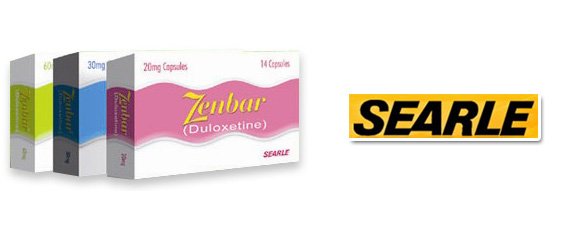- Zenbar 20mg Capsule contains
Duloxetine 20mg - Zenbar 30mg Capsule contains
Duloxetine 30mg - Zenbar 60mg Capsule contains
Duloxetine 60mg
Zenbar is a combined serotonin and nor adrenaline reuptake inhibitor. It inhibits dopamine reuptake without having any affinity for histamine, dopamine, cholinergic and adrenergic receptors. In several pre-clinical models of neuropathic pain, Zenbar normalized the pain thresholds and also weakened the pain behavior in a model of persistent pain.
What is Zenbar used for?
- Major Depressive Episodes
The efficacy of Zenbar (duloxetine) at 60mg dose once a day has been demonstrated in three out of three randomized, double blind, placebo controlled, fixed dose acute studies with major depressive disorders.
Zenbar has superior efficacy over placebo as measured in both emotional and somatic symptoms of depression.
The tolerability of Zenbar 60 mg once a day in elderly group of patients was compared to that seen in the younger adults.
The data in the elderly group of patients exposed to120 mg per day is limited so caution is to be taken when rendering treatment to the elderly group. - Diabetic Peripheral Neuropathic Pain
The effect of Zenbar was studied in 2 randomized, double blind, placebo controlled, fixed dose trial having diabetic neuropathic pain for 6 months.
Both the studies for Zenbar 60 mg once daily and 60 mg twice daily showed reduced pain when compared to placebo.
Dosage of Zenbar Capsules in Major Depressive Episodes
The starting and recommended maintenance dose of Zenbar is 60 mg once daily with or without food. The doses above 60 mg once daily and up to120 mg per day in divided doses have been evaluated from safety point of view in the clinical trials.
There is no clinical evidence that patients not responding to the initial recommended dose may benefit from dose up-titrations. Therapeutic response is seen within 15-30 days of treatment. It is recommended to continue the treatment for several months in order to avoid relapse.
Dosage of Zenbar in Diabetic Peripheral Neuropathic Pain
The starting and recommended maintenance dose is 60 mg once daily with or without food. The doses above 60 mg once daily and up to120 mg per day in divided doses have been evaluated from safety point of view in the clinical trials.
The plasma concentration of Zenbar (duloxetine) varies from individual to individual, therefore, some patients might benefit from a higher dosage instead of 60 mg dose.
When to avoid Zenbar?
Zenbar Capsules should be avoided in case of hypersensitivity to Duloxetine or to any of its excipients. Use of non-selective, irreversible Monoamine Oxidase Inhibitors (MAOIs) with Zenbar is also contraindicated. Zenbar is not to be used with fluvoxamine, ciprofloxacin or enoxacin since these cause elevated plasma concentrations of duloxetine.
Possible Side Effects of Zenbar
Patients being treated with Zenbar for depression, reported most commonly with side effects like nausea, dry mouth, headache and constipation. Mild to moderate side effects were seen early during the therapy and subsided as the therapy progressed on.
The side effects of Zenbar seen in patients with diabetic neuropathic pain were nausea, headache, dizziness and somnolence. Stopping treatment with Zenbar, often leads to withdrawal symptoms. Gradual dose tapering is required when treatment with Zenbar is no longer needed.
In patients with diabetic neuropathic pain, it was seen during the clinical trials that Zenbar (duloxetine) had an elevation in fasting blood glucose levels. However, HbA1c was stable in both placebo and Zenbar (duloxetine) treated groups.

Leave A Comment